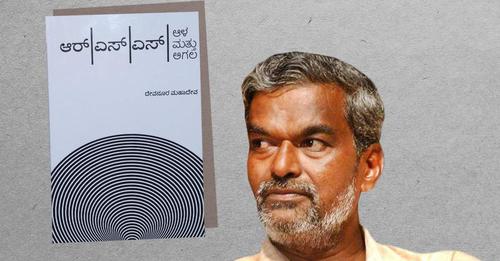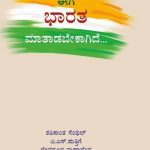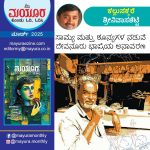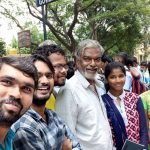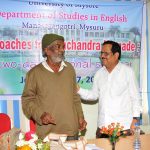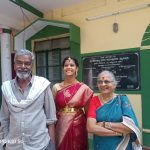My Book on RSS Seeks to Unite Communities Against Lies and Hate—Devanuru Mahadeva
[Devanooru Mahadeva’s interview by Prof.Rajendra Chenni, in newsclick.in on 1.8.2022 …ದೇವನೂರರ “ಆರ್.ಎಸ್.ಎಸ್.ಆಳ ಮತ್ತು ಅಗಲ” ಕೃತಿಯನ್ನುಕುರಿತು ಪ್ರೊ.ರಾಜೇಂದ್ರ ಚೆನ್ನಿಯವರು ನಡೆಸಿದ ಸಂದರ್ಶನವು 1.8.2022 ರಂದು newsclick.in ನಲ್ಲಿ ಪ್ರಕಟವಾಗಿದೆ.]
https://www.newsclick.in/my-book-rss-seeks-unite-communities-against-lies-and-hate-devanuru-mahadeva
https://hindi.newsclick.in/my-book-rss-seeks-unite…
The doyen of Kannada literature says private disagreement is not enough to fight forces weakening the Constitution. People must understand the truth and organise to spread this message widely.
Devanuru Mahadeva is amongst the most well-known and highly-regarded literary voices in Karnataka. He is also an outspoken critic of the Rashtriya Swayamsevak Sangh (RSS) and recently wrote and published RSS: Aala Mattu Agala—RSS: It’s Depth and Width. The book, which retraces the footsteps of the countrywide expansion of the RSS, instantly sold thousands of copies and quickly became available in translations, also flying off the shelves. The success of Aala Mattu Agala reveals the extent of anger and dissatisfaction in Karnataka and beyond over the expanding footprint of the RSS and its political offshoot, the Bharatiya Janata Party (BJP). Rajendra Chenni recently spoke with Mahadeva about why he wrote the book, its unusual publication style, and what worries him most about the RSS and BJP’s growing hegemony and control over institutions and politics. He says citizens must be able to identify the root causes of the “destructive chaos caused by fringe groups of the RSS”.
Rajendra Chenni (RC): Criticism of right-wing ideas are not new to your writings or works. Many of the articles in your work Edege Bidda Akshara offer harsh criticism of such ideas. However, in this work, you have attempted to capture the soul of the RSS. What motivated you to write this book?
Devanuru Mahadeva (DM): I do not usually use the terms ‘left-wing’ and ‘right-wing’. Once, at a meeting, the details of which I do not remember, someone called me a ‘leftist’. I told the gathering that in the time of the French empire, people who wanted change seated themselves towards the left of the emperor and those who did not, sat towards his right. I then asked the person who made the comment, “So, are you a leftist or a rightist?” and he said, “I am a leftist.” Today, these words are not alive. So, for the sake of simplicity, I use the words ‘forward’ and ‘backward’ instead.
My attempt to capture the soul of the RSS was motivated by a variety of reasons—the instigation of the RSS, the shenanigans by the BJP government, and the destructive chaos caused by the fringe groups of the RSS. A few incidents had been bothering me for quite a while. I had written briefly about reservation for the EWS. I had also prepared some notes on the Karnataka Protection of Right to Freedom of Religion Bill, 2021 which, in reality, prohibits religious conversion.
At a time of such deep turmoil, the textbook controversy broke out. The government caused a lot of trouble in this matter. When I objected to the inclusion of Hegdewar’s text in the curriculum, the honourable education minister B.C. Nagesh disregarded it. He did not, even for a moment, consider my objections. My intention was to ask how Hegdewar would be introduced to the students. I wanted to discuss if it would be appropriate for the education of children to introduce Hegdewar as the founder of the RSS, which was based on the Chaturvarna stratification of the Hindu religion. I stated that such saffronisation of the curriculum was an ongoing programne of the NDA government since the time of Murli Manohar Joshi who was then the MHRD minister. The honourable education minister B.C. Nagesh responded to this statement by saying, “Devanoora Mahadeva is correct. The Vajpayee government had many notable achievements to its credit. There were good roads developed.”
Now, how do I respond to such a statement? During this entire incident, the BJP leaders and pro-RSS intellectuals were all up in arms. There were others who were making scurrilous statements. When the Sanehalli pontiff wrote to the chief minister about the distorted portrayal of Basavanna in the texts, the chief minister replied saying, “Yes, there have been some minor errors. They will be rectified.” Basavanna’s portrait is present, but its soul has been carved out and removed. If they can term such a distortion a minor error, what can be said about such a matter? This caused deep turmoil in me. To come out of this turmoil, I spent a month reading more about the issue to be able to get to the root of it. I struggled for another two weeks to write about it. It took me more than a month to edit it to make it clear and simple.
RC: In propagation of the RSS ideas, you have observed the attempts to make mischievous, outdated and dangerous ideas of the past contemporary. What is the reason for their obsession with the past? Is RSS making an absurd attempt to drag the country back into the historical times?
DM: I have made attempts to understand this very phenomenon, I have tried to retrace the footsteps of the growth of the organisation. Whatever I learnt, I have written about it.
RC: You have said that the purpose of your book is to draw attention to the vast difference between the perception of the RSS and its reality. Even to this day, the RSS commands praise and defence from the educated Indian middle class. How did this come to be?
DM: This is the age of commercialisation. The value of an object is decided by the glamour of the marketing strategy rather than its quality. The ‘use and throw’ principle has grown to denote the cultured, civilised norm in the society. Human intelligence, ingenuity and talent have become tools for deceiving the common man. They spend more money trying to evolve strategies to defraud people rather than promoting human values. Under such circumstances, we arrive at the situation we now find ourselves in.
RC: You have quoted Golwalkar praising the tactics of the Nazis in exterminating the Jews to protect the purity of the Aryan race and advocating the employment of similar tactics against the Indian minorities. This is an idea that is terrifying even in this day and age. Many intellectuals are of the opinion that India is on the brink of a genocide. Do you think that the genocide of the minorities and its supporters is imminent?
DM: I think after a certain point, there are things that are beyond human logic or comprehension. We have seen at times that situations turn around completely. History has demonstrated that any ‘extreme’ situation can die out by digging its own grave. The same is happening at present. Even in our unconscious minds, we all know stories of mythological entities who had to bite the dust when their egos grew too large.
RC: Golwalkar and Savarkar had both opined that the Manusmriti should be the true Constitution of the country. Babasaheb Ambedkar had set fire to the Manusmriti in public. Does that not mean that the RSS is an enemy of the Constitution?
DM: Does one need to ask a fortune teller to answer this question, Chenni?
RC: You have referred to Golwalkar who had given the example of Kerala to demonstrate the superiority of the Aryan race and later retracted his statement. Does this not still form a core tenet of the RSS? What should we do to oppose this belief?
DM: We should first understand the truth without adding lies and wild conjecture. It is not enough if we just express our views amongst ourselves. We should organise small activities to take this message to the people. It is the community which needs to speak about this issue.
RC: You have said that Modi has dealt a blow to the Constitution by giving the EWS reservation. What should be the nature of our struggle for reservation at a time when the RSS is destroying the very concepts of social justice and reservation?
DM: On the one hand, the backward classes and rural communities must actively participate in the setting up of small co-operative organisations for generation of self-employment and for nurturing the talent of local communities. A volunteer from each household must come forward to accomplish collective tasks for the good of the entire village and so on. Wherever possible, people from such communities should also avail of educational opportunities. On the other hand, people must be able to debate and discuss the anti-people policies and laws of the government. Those who wish to save us should always watch out for the forces that seek to weaken the Constitution. A movement to spread awareness about participatory democracy and reservation for the oppressed classes in private sectors may be necessary.
RC: You have argued that it is necessary for all organisations to join hands in the struggle against the RSS. Why has this been difficult to achieve? What roles have the Dalit organisations in Karnataka played in this regard?
DM: Look at the recent developments. Earlier, all the leading organisations of the state operated individually. In recent times, they are all coming together to form alliances. There have also been many struggles launched to achieve this. Be it the protests against the CAA or the anti-farmer laws, they all have been carried out under federations of organisations. Also, the Janandolana Mahamaitri is a progressive platform that has come into existence. I have seen from close quarters that the Dalit and farmers’ organisations have nearly become sister organisations. According to me, this is an extraordinary development. The main issue here is that the organisations making up the federation continue to revolve around their own ideology and principles. When we start living in the present, many problems get resolved. Then, rigidity can reduce and creative thought evolves. What they consider ideology can also blossom.
RC: One of the solutions you put forth is the necessity for the development of discernment. Is this possible amidst the cycles of biased media, fake news and systemic dissemination of propaganda?
DM: It is true that there has been a whirlwind of fake news and paid news that is sweeping across the country. There is also a concerted, systematic effort to portray those who speak the truth as ‘traitors.’ What should we do under such circumstances? How long can we continue to become frustrated by criticising them? Is it not possible to utilise new technology available to create media that can reach crores of people? Such attempts are being made in front of our eyes. We do not recognise such attempts.
In Karnataka, many organisations have come together to start a website called www.eedina.com. The website is already functioning, but will be fully launched on August 15th. I have also joined hands in supporting this venture. This is a new age movement that is being supported by hundreds of writers, progressive activists and technologists. We recognise that it is not enough to organise people through Whatsapp and Facebook. Instead, we have created a community of media persons at the grassroot level in nearly 100 taluks. This movement is spreading to other taluks as well. The annual subscription to this website is Rs. 1000. The life membership is Rs. 1,00,000. Anybody willing to contribute Rs. 10,00,000 can also become an investor. Is it too hard to find 50 people in Karnataka who can contribute Rs. 10,00,000? Similarly, can we not find 1,000 people to become subscribers for 10 years? With great difficulty, I have decided to become an investor. I would request you and your friends to also become investors.
“Once this website launches, the true facts about the lives of the common people will be at the centre of the discussion on a public platform. In place of politics fuelled by lies and hatred, truth and love will take centre stage. This is a novel attempt towards changing the modes of thought of the society with pro-life ideas. This is a movement to protect and nurture truth, justice and humanity.”
This is the new media’s motto. How long can we keep talking about how they set fire and destroy society? From now onwards, let us talk about our truth. As far as possible, let us get involved in minor activities.
RC: Your work is being published in large numbers and is in constant demand. Had you anticipated that it would create such a flurry? Can this enthusiasm grow further to be a force of political resistance?
DM: I do not know if it can grow into a force of political resistance. I had not anticipated that my book RSS Aala Mattu Agala would be distributed so widely. The first edition of the booklet RSS Aala Mattu Agala was published at the end of June. It is now July. When I enquired as to how many copies have been sold, I was told that over one lakh copies have been bought by readers. I also learnt that many people are still sending in money to get more copies published. This is beyond my understanding.
It could also be this ̶ the publication of the book was in itself a unique experiment. This was done with foresight. When six publishers got together to print 9,000 copies of the book, they were all sold out in just two days. They began to reprint the booklet. One incident of note is that a few taluks came together to form their own publishing houses to print the booklet. A few organisations have also come forward to print my work. For instance, Shrama Kumar from Manasa Gangotri in Mysore, along with his friends, have raised funds to print 2,000 copies of the booklet and are distributing it. A few women from Gulbarga and youth from Davangere have come forward to print and distribute the book. So has a retired official who decided that he has spoken enough so far and would now like to invest money in publishing the booklet and donate the funds so gathered to another taluk. In many places, the booklet is being gifted at weddings and house warming ceremonies. Congress and JD(S) and members of other parties have bought thousands of copies of the books and are distributing them. Don’t think the BJP members have kept away from this!
RC: Would you like to say anything to Shudra and Dalit youth who are foot soldiers of the RSS and are involved in destructive and violent activities?
DM: At the very least, let us call them former Shudras. Let us collectively call them Dalits, Adivasis from backward communities and nomads. If you say that youth from such communities have become foot soldiers, I must ask where are the employment opportunities for such youth? Modi has plunged the country into unemployment. The youth are directionless and wander around without purpose.
On the other hand, there are individuals, groups and organisations that are resisting the RSS. They are involved in refuting the fake news disseminated by the paid IT cells of the RSS. However, they are expending all their time and energy in waging a war against such propaganda. They are constantly thinking of the RSS. If they had spent a few minutes in quiet reflection, they would have realised that they have become islands. They could have identified local efforts to which they could have directed their energy. Community living would have developed. What can I say to them? Even if I said something, those who are habituated to such a routine will not stop to listen. I am helpless. I can only pray.
(Rajendra Chenni is an academic, writer and the director at Manasa Centre for Cultural Studies, Shivamogga. He has been involved in several movements for communal harmony)
